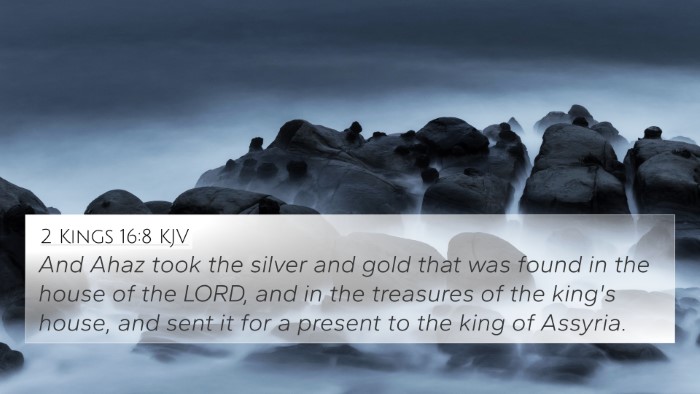Understanding 2 Kings 18:15
Verse: “And Hezekiah gave him all the silver that was found in the house of the Lord, and in the treasuries of the king’s house.”
The context of 2 Kings 18:15 involves King Hezekiah's response to the threat posed by the Assyrian king, Sennacherib. This passage illustrates the desperate measures taken by Hezekiah to protect his people and his kingdom from invasion and destruction.
Commentary Insights
-
Matthew Henry's Commentary:
Henry emphasizes the extent of Hezekiah's desperation, stating that giving away the treasures of the house of the Lord was a sign of his faith in God being tested. While it may seem pragmatic, it also signifies a lack of trust in divine protection at this critical time.
-
Albert Barnes' Notes:
Barnes infers that the act of giving silver from the temple and royal storehouses reflects both desperation and a reliance on political strategy rather than faith. He notes the temple's treasures were set aside for the service of God and were sacred, highlighting that Hezekiah’s actions, although practical, could be viewed as sacrilege.
-
Adam Clarke's Commentary:
Clarke notes that Hezekiah’s decision reveals a moment of yielding under pressure and suggests that this action is indicative of the broader spiritual decline in Israel. He further discusses the impact of such actions on the national and religious sentiment of the people.
Spiritual Themes and Biblical Connections
This verse also opens up opportunities for cross-referencing with other scriptures. Here are some significant connections:
- Isaiah 36:4-7: Assyrian threats mirror the situation faced by Hezekiah. These verses provide insight into the political dynamics during Hezekiah's reign and the LORD’s response to human threats.
- 2 Chronicles 32:1-8: This parallel narrative offers additional details about the Assyrian invasion and Hezekiah's defense, showcasing his reliance on God amidst adversity.
- Philippians 3:19: Shares a thematic connection by discussing the futility of trusting in earthly treasures versus spiritual integrity.
- Matthew 6:19-21: Jesus teaches about laying up treasures in heaven instead of earthly riches, drawing a stark contrast to Hezekiah's actions.
- 1 Timothy 6:10: Discusses the dangers of loving money, which can lead to spiritual downfall, paralleling the temptations faced by leaders like Hezekiah.
- 2 Kings 16:8: References the previous actions of Ahaz, Hezekiah's father, who similarly gave treasures from the house of God to secure his political power, demonstrating a pattern of reliance on material wealth.
- Proverbs 11:28: This verse conveys the idea that trust in riches is ultimately misled, paralleling Hezekiah's situation.
Thematic Analysis
This passage serves as a reminder of the importance of faith over material reliance. Hezekiah’s choice can be examined through various lenses:
- Faith vs. Fear: Hezekiah's actions were taken in fear of the Assyrians, posing the question of what true faith looks like when faced with overwhelming earthly challenges.
- Spiritual Integrity vs. Political Savvy: The act of removing sacred items raises the issue of spiritual integrity in political situations, a theme relevant throughout the Bible.
- Desperation’s Influence: How do desperate times influence moral and spiritual choices? This theme echoes through the narratives of not just Hezekiah but also characters like David and Job.
Cross-Referencing Resources
For those interested in deepening their study on this verse and similar contexts, consider the following tools:
- Bible Concordance
- Bible Cross-Reference Guide
- Bible Reference Resources
- Comprehensive Bible Cross-Reference Materials
- Cross-Referencing Bible Study Methods
Conclusion
2 Kings 18:15 is emblematic of a leader’s struggle between faith and fear, showcasing a pivotal moment that shaped the trajectory of Judah. By examining cross-references and thematic connections to this verse, one can gain a richer understanding of its significance within the greater narrative of the Bible.
This verse encourages readers to explore the connections between Bible verses and the broader themes that run throughout scripture, promoting a deeper understanding of inter-Biblical dialogue and the relationships that exist between different passages.







